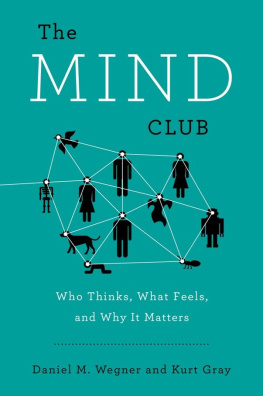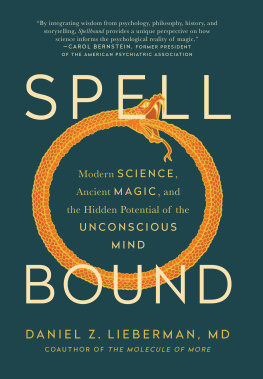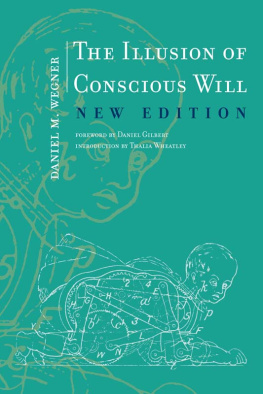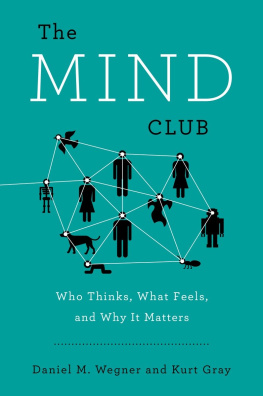Wegner Daniel M - The Mind Club: Who Thinks, What Feels, and Why It Matters
Here you can read online Wegner Daniel M - The Mind Club: Who Thinks, What Feels, and Why It Matters full text of the book (entire story) in english for free. Download pdf and epub, get meaning, cover and reviews about this ebook. year: 2016, publisher: Penguin Publishing Group, genre: Religion. Description of the work, (preface) as well as reviews are available. Best literature library LitArk.com created for fans of good reading and offers a wide selection of genres:
Romance novel
Science fiction
Adventure
Detective
Science
History
Home and family
Prose
Art
Politics
Computer
Non-fiction
Religion
Business
Children
Humor
Choose a favorite category and find really read worthwhile books. Enjoy immersion in the world of imagination, feel the emotions of the characters or learn something new for yourself, make an fascinating discovery.
- Book:The Mind Club: Who Thinks, What Feels, and Why It Matters
- Author:
- Publisher:Penguin Publishing Group
- Genre:
- Year:2016
- Rating:4 / 5
- Favourites:Add to favourites
- Your mark:
- 80
- 1
- 2
- 3
- 4
- 5
The Mind Club: Who Thinks, What Feels, and Why It Matters: summary, description and annotation
We offer to read an annotation, description, summary or preface (depends on what the author of the book "The Mind Club: Who Thinks, What Feels, and Why It Matters" wrote himself). If you haven't found the necessary information about the book — write in the comments, we will try to find it.
The Mind Club: Who Thinks, What Feels, and Why It Matters — read online for free the complete book (whole text) full work
Below is the text of the book, divided by pages. System saving the place of the last page read, allows you to conveniently read the book "The Mind Club: Who Thinks, What Feels, and Why It Matters" online for free, without having to search again every time where you left off. Put a bookmark, and you can go to the page where you finished reading at any time.
Font size:
Interval:
Bookmark:


VIKING
An imprint of Penguin Random House LLC
375 Hudson Street
New York, New York 10014
penguin.com
Copyright 2016 by The Estate of Daniel M. Wegner and Kurt Gray
Penguin supports copyright. Copyright fuels creativity, encourages diverse voices, promotes free speech, and creates a vibrant culture. Thank you for buying an authorized edition of this book and for complying with copyright laws by not reproducing, scanning, or distributing any part of it in any form without permission. You are supporting writers and allowing Penguin to continue to publish books for every reader.
ISBN 978-1-101-60642-1
Version_1
I n Jorge Luis Borgess short story The Secret Miracle, a writer is unjustly imprisoned by the Nazis and sentenced to death. On the eve of his execution, he prays to God, asking for a year to finish his play. That night he dreams that his prayer is answered, but the next morning he is nevertheless led down to the firing squad in gloomy rain. As he stands in front of four soldiers, a heavy drop of rain graze[s] [his] temple and roll[s] slowly down his cheek; the sergeant call[s] out the final order.
But suddenly, miraculously, the universe stops:
The weapons converged upon [him], but the men who were to kill him were immobile. The sergeants arm seemed to freeze, eternal, in an inconclusive gesture.... As though in a painting, the wind had died. [He] attempted a scream, a syllable, the twisting of a hand. He realized that he was paralyzed. He could hear not the slightest murmur of the halted word. He thought... time has halted....
He had asked God for an entire year in which to finish his work; God in His omnipotence had granted him a year. God had performed for him a secret miracle: the German bullet would kill him, at the determined hour, but in [his] mind a year would pass between the order to fire and the discharge of the rifles.
In this secret year the writer crafts his play into perfection. Without the aid of movement, or speech, or writing, he repeats the acts in his head, honing every paragraph and polishing every word. At long last [h]e complete[s] his play; only a single epithet [is] left to be decided upon now. He [finds] it; the drop of water roll[s] down his cheek. He [begins] a maddening cry, he [shakes] his head, and the fourfold volley fell[s] him.
In 2010 Dan Wegner was diagnosed with ALS. This degenerative disease slowly destroyed his ability to walk, to stand, to move, to talk, to eat, andeventuallyto breathe. Before his diagnosis, Dan had conceived of this book in his mind, butlike Borgess prisonerhad only just begun writing it. Recognizing the inexorable march of his disease, Dan asked me to join him and help transform the ideas into words. It is my hope that his wisdom and wit shine through in these chapters; if they do not, the fault is mine alone.
My miracle, it is no secret, was having Dan as my graduate adviser. This book is dedicated to his creativity and unique perspective, to his witty one-liners, his collection of robots, and his ability to render clear the mysteries of human experience. May we always perceive his mind.
KG

N othing seems more real than the minds of others. Every day, you consider what your boss might be thinking, whether your spouse is happy, and what that shady crew of teenagers wants. The apparent reality of other minds is so powerful that youve likely never stopped to ask whether they actually exist. But there is a very real possibility that everyone you know could be mindless zombies.
Even your mother could be a zombie. She may not shuffle, groan, or eat brains, but she could still be a philosophical zombiesomeone who acts and speaks normally but who lacks conscious experiences. Your life may be filled with rich mental experiences, but your mothers could be completely empty. Instead of a bustling city of thought and emotion, Moms mental life might be like a Hollywood set, with only the appearance of reality. When you hug each other, you might feel warm and safe, but her brain might only robotically register the pressure of your arms. Now, you might think, No, not my mother! but how could you prove otherwise? Even sophisticated brain scans cant reveal what its like to be another person.
That your mother might be a fleshy automaton stems from the philosophical problem of other minds. Because we can never directly experience the inside of other minds, many questions about them are fundamentally unanswerable. Do strawberries taste the same to you as to someone else? Is your blue the same as someone elses blue? Perhaps when you look at the sky, you see what someone else would call yellow. If youre a man, then you can never know what it feels like to give birth. If youre a woman, then you can never know what it feels like to be kicked in the goolies.
More fundamental than the uncertainty of other peoples specific experiences, you can never be certain that other minds even exist. You might be the only mind in the whole world, the sole sentient being in a crowd of mindless drones or the lone true thinker within a computer-generated matrix.
The uncertainty of other minds has fueled centuries of philosophizing and also lies at the heart of some of the most interestingand most terriblehuman behavior. As we will see, it can explain how the Nazis could murder six million Jews, why animals are sometimes tortured for sport, and why people debate the existence of God so intensely. The mysterious nature of other minds can also help to explain the behavior of one British man named Dennis Nilsen.
Dennis Nilsen was born in 1945 in a seaside town in Scotland. After a brief stint in the army, he moved to London, where he worked first as a police officer and then as a civil servant. Despite his good job, Nilsen felt unfulfilled and isolated; he seldom spoke to his family, had few friends, and had difficulty maintaining close relationships. He also had dark fantasies about sexually dominating young men, whom he liked to imagine as completely passive or even unconscious. After the dissolution of one relationship, Nilsen began luring young men into his apartment with the promise of food, alcohol, and lodging. Once they were asleep, Nilsen would strangle them into unconsciousness before drowning and dismembering them in the bathtub. He managed to murder fifteen people before being discovered and sentenced to prison for life.
Strikingly, although Nilsen was a ruthless murderer of other people, he had the deepest affection for his dog, a mutt named Bleep. Following his arrest, Nilsens biggest concern was not about the families of those men he killed, or even about himself, but about his furry companionwould she be traumatized by his arrest? How could Nilsen be indifferent to the pain of those he murdered and yet be overwhelmed by the possible suffering of his dog?
Perhaps the answer is that his dog was special and somehow had deeper emotions and richer thoughtsthat is, more mindthan his victims. Most of us would scoff at this idea. No matter how cunning Nilsens canine, we generally agree that people have more mind than dogs, which means that people deserve more compassion and concern than dogs. But Nilsen decided otherwise, believing that his dog had more mind than people, which gave Bleep essential moral rights denied to humans. Nilsen disagreed with the rest of us about the relative status of humans and dogs in the mind club.
Font size:
Interval:
Bookmark:
Similar books «The Mind Club: Who Thinks, What Feels, and Why It Matters»
Look at similar books to The Mind Club: Who Thinks, What Feels, and Why It Matters. We have selected literature similar in name and meaning in the hope of providing readers with more options to find new, interesting, not yet read works.
Discussion, reviews of the book The Mind Club: Who Thinks, What Feels, and Why It Matters and just readers' own opinions. Leave your comments, write what you think about the work, its meaning or the main characters. Specify what exactly you liked and what you didn't like, and why you think so.











